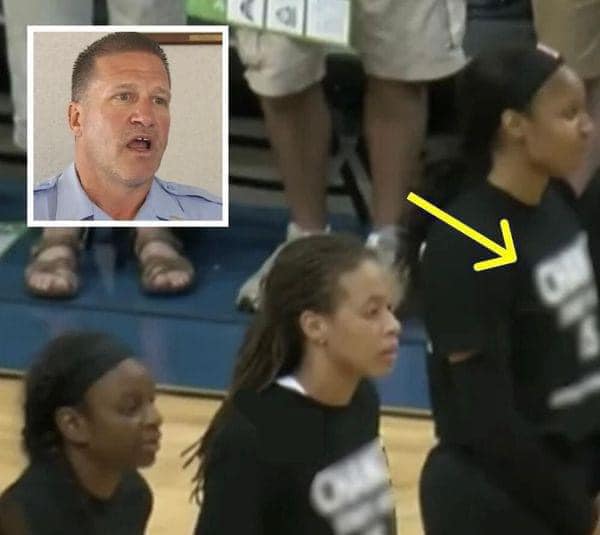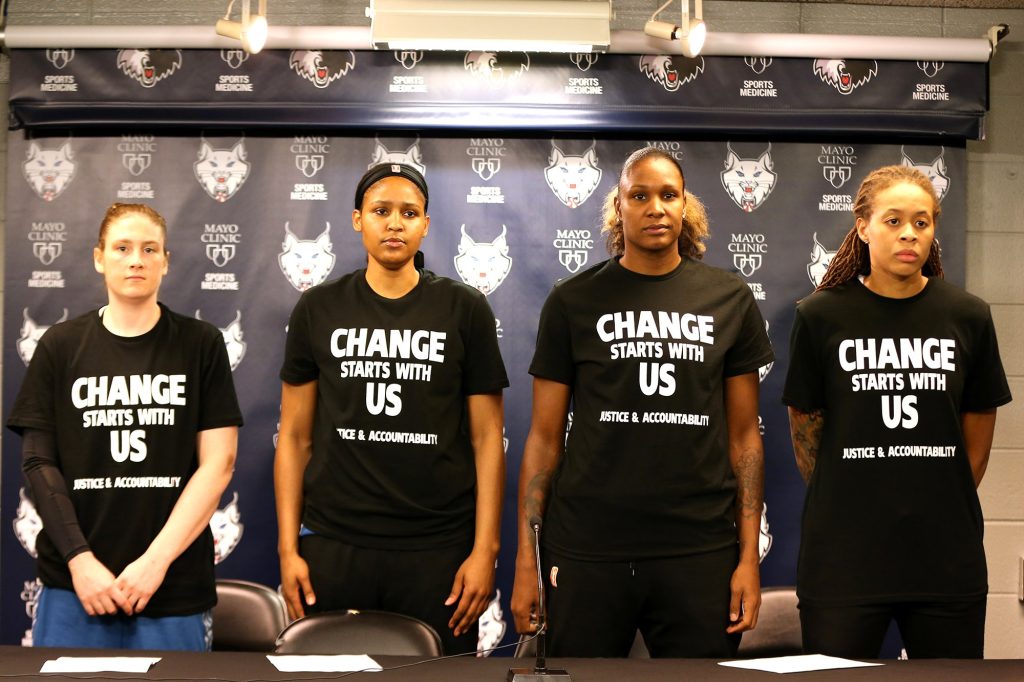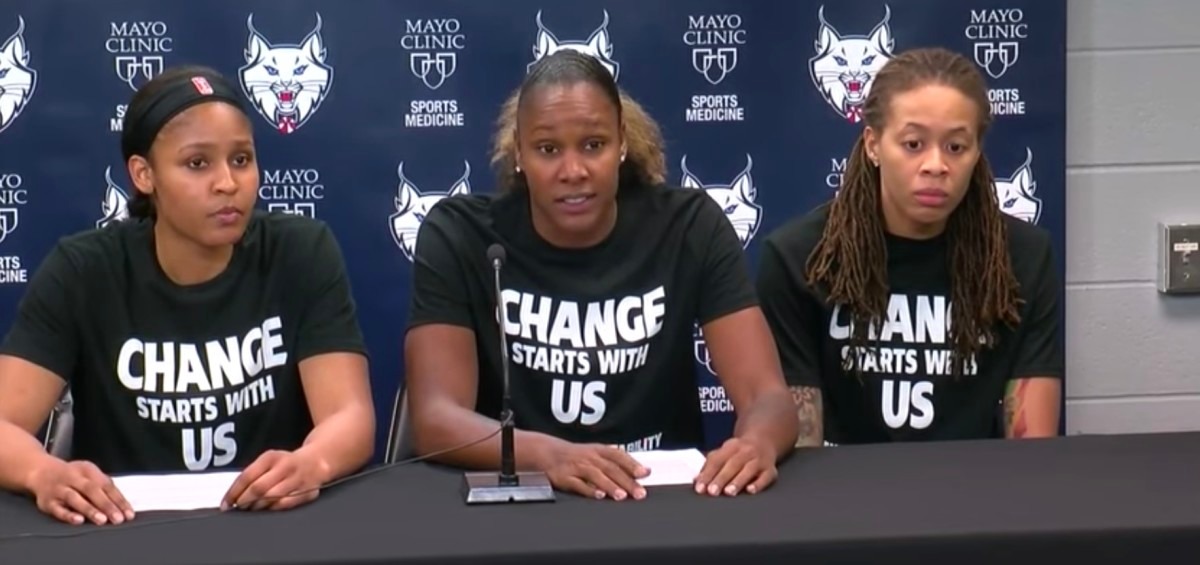During a WNBA Lynx game in Minneapolis, an unexpected incident unfolded when four off-duty police officers, working as security for the event, walked off their posts in response to the players’ choice of attire. The players had donned black t-shirts bearing the names of two Black men, including Philando Castile, who had been fatally shot by police. Castile’s death occurred during a traffic stop in Minnesota and had sparked nationwide discussions about police violence and racial injustice. The shirts also featured a Dallas police badge in tribute to five officers who were killed in the line of duty and the words “Black Lives Matter.” The players explained during a pre-game conference that their intention was to honor the dead, mourn the losses, and advocate for systemic change.
The sight of the shirts offended the police officers, who requested that team officials ask the players to remove them. When the team refused to comply, the officers chose to leave. The president of the police federation, Lt. Bob Kroll, criticized the protest as “anti-police,” claiming that the players were perpetuating a “false narrative” of police misconduct. He went on to argue that the players should focus on basketball, asserting that fans attended the game to enjoy sports, not politics.
Minneapolis Police Chief Janeé Harteau acknowledged the frustration felt by the officers but disapproved of their decision to abandon their duties. She emphasized that when in uniform, officers are expected to uphold the core values of the department and honor their oath of office. Harteau stated that walking off the job violated the public’s trust and failed to meet the professional standards associated with wearing the uniform. Minneapolis Mayor Betsy Hodges also weighed in, taking to Facebook to condemn Kroll’s remarks as “jackass remarks” and clarifying that his opinions did not reflect her stance on the Lynx or any other matter.
Despite the controversy, the Lynx players stood firm in their convictions. They continued to wear the shirts during warm-ups at subsequent games, with other WNBA teams joining in solidarity by sporting similar apparel. This act of unity amplified the conversation around police-community relations, racial profiling, and senseless violence. The players’ actions demonstrated the power of sports as a platform for social advocacy, inspiring dialogue and encouraging individuals to confront pressing societal issues.

The Incident’s Broader Implications
The officers’ decision to leave their posts sparked widespread debate about the role of personal beliefs in professional responsibilities. Many questioned whether the officers’ actions were appropriate, given their contractual obligation to provide security at the game. Critics argued that the decision undermined public trust and highlighted the tension between law enforcement and the communities they serve.
The incident also underscored the complexities of free speech and activism in professional sports. While the Lynx players sought to use their platform to advocate for justice and change, their message was met with resistance from individuals who perceived it as a direct attack on law enforcement. This clash of perspectives illuminated the challenges faced by athletes who attempt to merge their personal convictions with their professional roles.
Support for the Lynx Players
The Lynx players’ decision to wear the shirts was met with support from various quarters. Advocacy groups and civil rights organizations praised the team for their courage and willingness to address difficult issues. Fans and fellow athletes expressed solidarity, commending the players for using their visibility to shine a light on systemic injustices.
The support extended beyond the basketball court. Prominent figures in the entertainment and political arenas voiced their approval of the players’ actions, emphasizing the importance of raising awareness about racial inequality and police violence. The broader community’s backing reinforced the idea that athletes have a unique opportunity to influence public discourse and inspire change.

The WNBA’s Role in Social Advocacy
The WNBA has a history of supporting its players’ activism, and the league’s response to this incident was no exception. By allowing the players to continue wearing the shirts, the WNBA demonstrated its commitment to fostering an environment where athletes can express their beliefs. This stance set an example for other sports organizations, highlighting the potential for professional leagues to serve as platforms for social progress.
The solidarity shown by other WNBA teams further amplified the message of the Lynx players. Teams across the league donned similar shirts, creating a unified front in support of racial justice and police accountability. This collective action underscored the power of unity in driving meaningful conversations and promoting awareness.
Lessons Learned
The controversy surrounding the Lynx players’ protest and the officers’ walkout serves as a reminder of the importance of dialogue and mutual understanding. While the incident exposed deep divisions in perceptions of social justice and law enforcement, it also highlighted the need for constructive conversations about these issues.
For law enforcement, the incident underscored the importance of maintaining professionalism and honoring commitments, even in the face of personal disagreements. The actions of the four officers sparked a broader discussion about the role of police in fostering trust and building bridges with the communities they serve.
For athletes and activists, the Lynx players’ actions demonstrated the power of persistence and solidarity. By standing firm in their beliefs and continuing to advocate for change, the players exemplified the potential for sports to drive social impact.

A Continuing Conversation
The Lynx players’ protest and the subsequent fallout from the officers’ walkout have left a lasting impact on discussions about racial justice and police-community relations. The incident served as a catalyst for conversations that extend beyond the basketball court, encouraging individuals and organizations to reflect on their roles in addressing systemic issues.
As the players continued to wear their shirts and other teams joined in solidarity, the message of “Black Lives Matter” resonated with audiences across the country. The visibility of their actions reinforced the importance of addressing racial inequality and advocating for meaningful change.
In conclusion, the events surrounding the WNBA Lynx game in Minneapolis illustrate the complexities of activism, free speech, and professional responsibilities. While the incident revealed deep divides, it also highlighted the potential for sports to serve as a platform for social progress. The Lynx players’ courage and commitment to their cause have left an indelible mark, inspiring others to raise their voices and work toward a more just and equitable society.



